NAME
Che's full name was Ernesto Guevara de la Serna. (Guevara was his father's surname, de la Serna was his mother's surname. He wore both in the official documents as it is a habit in Spanish-speaking countries.)
When he was a new-born baby, he was called Teté by his parents, to distinguish him from his father who wore the name Ernesto as well.
A few days later 'Teté' was changed into 'Ernestito' and his parents called him this way even if when he was a grown-up man, one of the heroes of Cuba and Latin America. (When his parents arrived at Havana after the victory of the Revolution, to meet their son after six years, they called him Ernestito which made Camilo Cienfuegos laugh hard.)
During his childhood and young years, he had several nicknames. He enjoyed shocking people and he often behaved wildly, that is why he was called 'El Loco Guevara' (meaning The Crazy Guevara). He was nicknamed 'El Furibundo Serna' or 'Fúser' (meaning furious) when he played rugby - because of his wild style of playing. One of his most famous nicknames was 'El Chancho' (meaning the Pig) because he often boasted about how rarely he bathed and washed his clothes. He even told to his friends once that "It's been 25 weeks since I washed this rugby shirt." and that he stopped wearing shorts only because they were so dirty that he had to throw them away.
When he was in Mexico and he met Cuban exiles for the first time, he made friends with one of them, Ñico López, who gave him the nickname 'Che'. The word 'Che' was widely used in Latin America to refer to Argentines. Argentine people used this word as a simple interjection (meaning "hey, you" "man") and Che used it often too.
Che loved his nickname. He said: "For me, Che represents the most essential, the most loved aspect of my own life. How could I not like it? The first and second names of a person are small things, personal, insignificant. In contrast, I like it very much when people call me Che."
He was called 'Tatu' when he was in the Congo. (Tatu means third in Swahili, referring that he was only the third person in the command.)
He was called Ramón and Fernando when he was in Bolivia. (When he worked as a dentist among the peasants and his combatants, he was called Fernando Sacamuelas - sacamuelas means tooth-puller or charlatan.) One of his fake passports was for the name Adolfo Mena González, the other one was for Ramón Benítez Fernández.
FAMILY
Parents:
Father: Ernesto Rafael Guevara Lynch (11 February 1900 – 1 April 1987)
Mother: Celia de la Serna y Llosa (21 June 1906 – 18 May 1965)
Brothers and sisters:
Celia (born in December 1929 - )
Roberto (born on 18 May 1932 - )
Ana María (January 1934 – 22 June 1990)
Juan Martín (born on 18 May 1943 - )
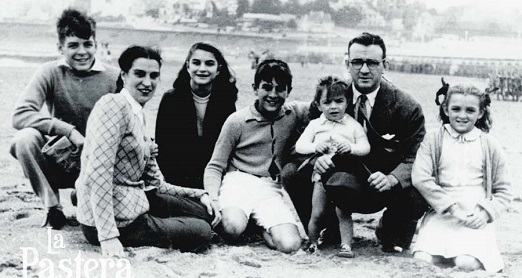
Che Guevara was married twice and he had five children.
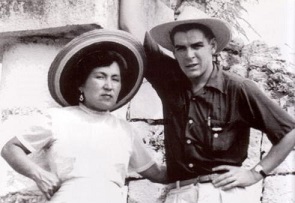 His first wife was Hilda Gadea Acosta, an economist from Peru, who had Chinese and Indian ancestry. His first wife was Hilda Gadea Acosta, an economist from Peru, who had Chinese and Indian ancestry.
Hilda was born in March 1921 in Lima and she died in February 1974 in Havana.
She was the first female secretary for Alianza Popular Revolucionaria Americana (APRA).
Because of her revolutionary acts, she had to leave Peru in 1948 and she went into exile.
In December 1953 she met Che Guevara in Guatemala, then they moved to Mexico together. It was Hilda, who introduced Che to the Cuban revolutionaries.
Hilda and Che quickly became friends, then they had a sexual relationship as well. in the summer of 1955 she got pregnant so on 18th August 1955 they got married. (Hilda claimed that Che proposed for her hand many times, while Che hardly wrote anything about her in his diaries or letters. According to some friends, Che didn't want to get married - he married Hilda only because she got pregnant.) In November they took a few days off and had a small honeymoon in Mexico, visiting ancient ruins.
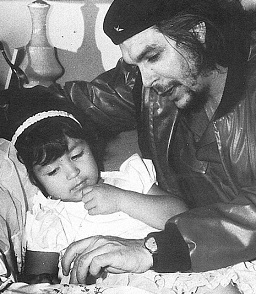 Their daughter, Hilda Beatriz Guevara Gadea (Hildita) was born on 15th February 1956. (Beatriz was Che's favourite aunt.) Their daughter, Hilda Beatriz Guevara Gadea (Hildita) was born on 15th February 1956. (Beatriz was Che's favourite aunt.)
Che adored his daughter - while the loveless marriage went into ruins. He confessed to his parents that it ended by Hildita's birth.
He soon joined the Cuban revolution, leaving his wife and daughter behind, then on 25th November 1956 he left for Cuba on the board of Granma. The revolution won in January 1959.
Then Che invited Hilda to come and bring Hildita to Cuba. Arriving, Hilda became sad because she had to realise that her husband didn't want to stay with her - Che confessed to her that during the fights in Santa Clara he met and fell in love with Aleida March de la Torre, a female combatant, and he wanted to divorce from Hilda.
The divorce took place on 2nd June 1959. Hilda stayed in Havana, she worked and wrote there, keeping contact with her ex-husband (this annoyed Aleida very much) while sending Hildita to him, so the little girl was raised by Che and his second wife.
Hildita became a librarian, always stayed true to her father's ideas and to her "uncle Fidel" - even though sometimes she criticised the policies of the government. She got married and in 1974 she had a son, Canek, who is the guitarrist of the Cuban rockband, Metalizer. She was only thirty-nine years old - at the same age like her father - when she died of cancer in 1995.
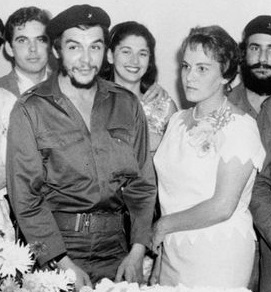 Aleida March de la Torre was born on 18th February 1934 in Santa Clara. She was active in the Cuban revolution. When the regime noticed her, she joined Che's column in December 1958 to avoid prison. She went to the rebel camp bringing money - the banknotes were strapping all over her body. Aleida March de la Torre was born on 18th February 1934 in Santa Clara. She was active in the Cuban revolution. When the regime noticed her, she joined Che's column in December 1958 to avoid prison. She went to the rebel camp bringing money - the banknotes were strapping all over her body.
At first Che wasn't glad to have the pretty girl in his column, but soon he could see that Aleida worked seriously and she did everything to be useful. He even gave her a weapon.
In the last days of December during the fights in Santa Clara, Che realised that he fell in love with Aleida. On the road to Havana, he confessed his love for her - she was so surprised that she couldn't reply to him.
As soon as the divorce took place, Che married Aleida on the same day - 2nd June 1959. The wedding was held in the fortress of La Cabaña where Che was the commander.
Che and Aleida had four children:
Aleida /Aliusha/ 24th November 1960.
Camilo (named after Camilo Cienfuegos) 20th May 1962
Celia (named after Che's mother) 14th June 1963
Ernesto /Ernestico/ 24th February 1965
Aleida wrote a book titled Evocation about her love and life with Che.
Aleida March and the Guevara-children:
Aleida - Hildita (with Ernesto in her arms) - Celia - Camilo

Hildita - just one year before her death - beside her Alberto Granado is standing, a close friend of Che, with whom he had the motorcycle trip, the other leading character in the famous Diarios de Motocicleta):
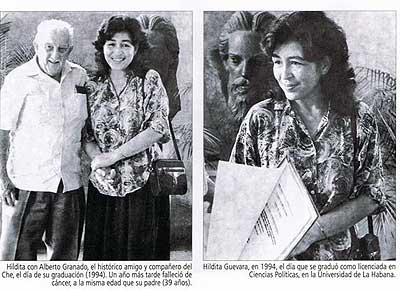
Aleida and her children after the years of 2000:

Aleida March - Celia and Aleida Guevara - Camilo Guevara - Ernesto Guevara
Rumours
Some Spanish-speaking online articles claim that Che Guevara had an extramarital affair in Havana with Lidia (Lilia) Rosa López, a 20-year-old journalism student in 1963.
She visited a friend at work who was reading a book that caught Che's attention who also happened to be there. Lidia started flirting with him. Next time Che brought a book for her friend and another book (Corazon by Edmundo de Amicis) for Lidia. Then they started a short relationship that ended within a few months when Che often had to go abroad for long journeys. They never met again.
Lidia became pregnant from Che and a son, Ómar Pérez, was born on 19th March 1964. She chose his first name from the Persian poet, Omar Khayyam, whose book, 'Rubaiyat' Che lent her once. The boy thought that his father was Benito Pérez, Lidia's husband. He was in his twenties when her mother told him that his biological father was Che Guevara.
Today Ómar is a Buddhist priest and an acknowledged poet - [photo of Ómar]. He had a close friendship with Hildita Guevara Gadea until her death. He says she often drank a lot and she suffered from depression and though she loved her father, she wasn't very diplomatic about him.
Once Aleida Guevara said that the story of Che's affair and having a secret son is "the most enormous of stupidities". She said that López invented the story to defend her son and that the Guevara-March family asked Ómar to have a DNA-test made but he didn't even reply to the request. Ómar claims that he never talked to any members of her family.
There is another rumour that Che Guevara had an affair with Tania (Haydée Tamara Bunke Bider) in 1965 in Prague when they were preparing for the Bolivian campaign. Other sources claim that they actually did not stay in Prague at the same time. Some people even claimed that Tania was pregnant with Che's child at the time when she died in Vado del Yeso in Bolivia on 31st August 1967.
Sources: [source #1] [source #2] [source #3] [source #4]
|

